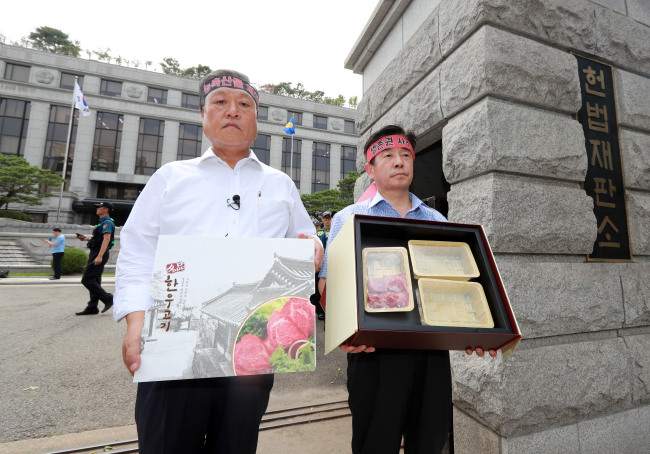The hard-hitting anti-corruption law on public officials, journalists and private school faculty was upheld by the Constitutional Court on Thursday, prior to formally taking effect on Sept. 28.
The Act on the Prevention of Illegal Solicitation -- also known here as “Kim Young-ran Law” after the former Anti-Corruption and Civil Rights Commission chief Kim Young-ran who proposed it in 2011 -- enforces criminal punishment on unlawful solicitation for the individuals in the public, education and media sectors.
It also punishes anyone of the aforementioned line of work who receives 1 million won ($888.9) or more in money, favors or gifts, regardless of the occasion.

Members of an association of farmers hold a protest in front of the Constitutional Court against its decision to uphold the disputed antigraft law on Thursday. (Yonhap)
But the inclusion of the media and education sector had touched off complaints that it was unfair and excessively broad in scope.
Related parties including the Korean Bar Association and the Journalists Association of Korea filed a petition against the Constitutional Court.
“The education and the media exert large influence over the society in general, and the corruption in the cited field has great ripple effect that inflicts damage that is both long-term and extensive ... As such, inclusion of private school officials and journalists was just,” the court said in its ruling, after reaching the decision on a 5:4 vote by its judges.
It dismissed claims against the section of the act that defines gifts that are allowed by “social norms” are not punishable by law. It is conventional in Korean society to hand out gifts as a token of friendship or gratitude in ceremonial occasions.
It was also decided that delegating the details -- including specific amounts for gifts that are allowed, and the fee for lectures -- to the ordinance was constitutional, along with the article that mandates reporting of bribery by spouses.
“(The ACRC) respects the decision by the Constitutional Court, and hope that the implementation of the act will root out corruption and build the integrity of the nation in a ground-breaking way,” said Kwak Hyung-suk, the head of the ACRC Anti-Corruption Bureau, in a media briefing held immediately after the ruling.
“In order for the act to be taken into effect on Sept. 28, the ACRC will carry out follow-up measures (after the ruling) for the remaining period. This will include enacting ordinance (related to the act), creating a manual and conducting information sessions for the people.
The KBA, on the other hand, released a statement condemning the ruling.
“Act on the Prevention of Illegal Solicitation allows those in power to reign in the press, subsequently uprooting the very basis of democracy, while aggravating distrust among spouses and infringe upon the people’s right to act freely via its vague definition of ‘illegal solicitation’,” it said. “The KBA strongly regrets the court’s decision on such unconstitutional, inhumane and anti-democratic law.”
The journalists’ association also protested the ruling, saying that the act may act as a “muzzle” for the reporters.
“There is now a possibility that the authorities may try to silence the press, using the Kim Young-ran law as an excuse,” the JAK said in a statement.
It added that the group “fully understand the necessity for the law,” but took issue with monitoring and regulating the civilian sector.
But progressive Lawyers for a Democratic Society, or Minbyun, welcomed the Constitutional Court’s ruling, saying that it will act as the first step toward eradicating everyday, small-scaled corruptions within the society.
The education sector was split on the decision.
The Korea Federation of Teachers’ Associations raised concerns over potential ”overlapping punishment, pointing out that bribery by teachers are already regulated by local education offices
But the Korea Teachers and Education Workers’ Union welcomed the decision and said that it will contribute to curbing corruptions by private school officials.
The ordinance on the Kim Young-ran law puts the threshold on the value of food and gifts during social meetings at 30,000 and 50,000 won, respectively. The money given on ceremonial occasions, such as weddings, are restricted to 100,000 won.
There have been complaints by local food and gifting industries that such restrictions will stifle them, as the law will make officials in the related sector reluctant to send out gifts.
Agriculture Minister Lee Dong-pil had told local media that his ministry -- along with the Ministry of Oceans and Fisheries, Small and Medium Business Administration -- will file for an adjustment of the law to the Ministry of Government Legislation, regardless of the ruling.
“While I agree with the law in principle, the scope of the law is too extensive, leading me to believe that it will have critical effect on domestic consumption,” he said.
By Yoon Min-sik (minsikyoon@heraldcorp.com)






